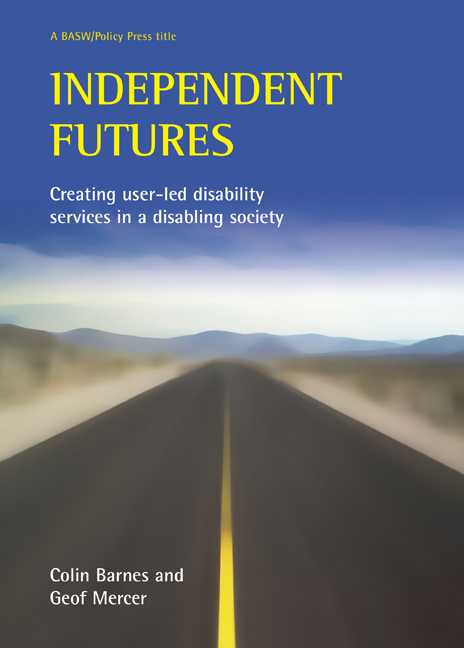Book contents
- Frontmatter
- Contents
- List of figures and tables
- Acknowledgements
- Notes on the authors
- one Examining user-led services
- two Traditional approaches: disability policy and the welfare state
- three Disability activism and the struggle for independent living
- four Researching user-led organisations
- five User-led organisations: building an alternative approach
- six Service design and delivery: opportunities and constraints
- seven Service users’ views and experiences
- eight Politics and campaigning
- nine Policy change or retrenchment?
- ten Future directions
- References
- Index
six - Service design and delivery: opportunities and constraints
Published online by Cambridge University Press: 15 January 2022
- Frontmatter
- Contents
- List of figures and tables
- Acknowledgements
- Notes on the authors
- one Examining user-led services
- two Traditional approaches: disability policy and the welfare state
- three Disability activism and the struggle for independent living
- four Researching user-led organisations
- five User-led organisations: building an alternative approach
- six Service design and delivery: opportunities and constraints
- seven Service users’ views and experiences
- eight Politics and campaigning
- nine Policy change or retrenchment?
- ten Future directions
- References
- Index
Summary
Introduction
This chapter focuses on the activities of user-controlled organisations as service providers and the associated constraints of a policy environment still dominated by traditional ideas about disability and dependence. How far and in what ways has service support for independent living worked out as intended in practice? This includes consideration of the ‘seven needs’ for independent living (and their subsequent extension) by user-led or user-controlled agencies. The discussion is grounded within recent trends in community-based services; in particular, the increasing emphasis on ‘Best Value’ with the goal of integrating high standards with efficiency and effectiveness in their achievement.
A specific requirement placed on service provider organisations over recent years has been the growing use of performance targets and general monitoring of their activities. This raises a number of issues for user-led organisations, particularly the cost of undertaking the monitoring process. It is resource intensive and is complicated by the often contrasting formats in which information is required by the various funding bodies.
The chapter concludes with a commentary on the precarious resource context in which user-controlled services currently operate, ranging over major concerns about: the level and continuity of funding, as well as its primary sources; the availability of staff, and particularly disabled people, with the appropriate skills and commitment to a social barriers approach; and the choice and availability of suitable physical premises. Hence, organisations under the direction of users operate in an often hostile service environment still dominated by an individualist approach – a challenge compounded by limited resources for action.
Delivering services in support of independent living
User demands for significant changes in services for disabled people provided by the statutory and voluntary sectors have been countered by arguments that local authorities and service providers operate under such tight financial constraints that they cannot possibly agree to the changes recommended. More recently, the policy rhetoric has shifted to an emphasis on a ‘Best Value’ approach, although it now seeks to incorporate the views of users in decisions about service provision:
Better councils are more actively involving users in shaping changes, setting standards and monitoring progress. Best Value has encouraged politicians, users, and partners to collaborate in new ways to achieve good quality at the best price.
- Type
- Chapter
- Information
- Independent FuturesCreating User-Led Disability Services in a Disabling Society, pp. 93 - 114Publisher: Bristol University PressPrint publication year: 2006

